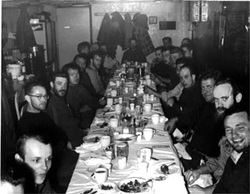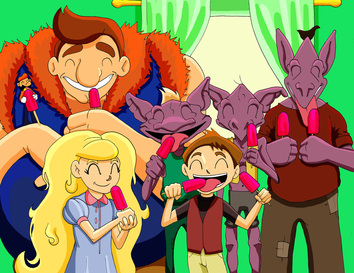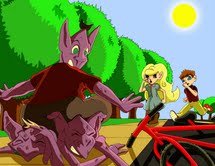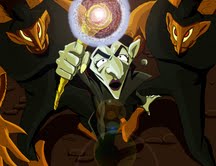|
My new book, entitled Tales from Kabekona, comes out September 5th. I've been working with illustrator Caleb Kirksey and my "publicist" Maggie Vande Vrede to complete the project this week. It's a collection of children's stories that follow the adventures of two siblings and their wild band of friends. There are the three friendly goblins - Zorgus, Borgus, and Daryl. Gugga the Giant. The Wee Lil' Man. And they encounter an evil woman, The Gray Witch, and her henchmen the Bemboils.
One of my friends read a draft a while back and asked, "Are you on drugs?" Only if you count caffeine. I've been telling stories to my children for at least 6 years. I estimate I've told over 1,500. Some not worth repeating. But I've used stories to teach my kids, and to answer their questions. I hope that sharing a few of them will be meaningful to others. At least the illustrations are cool. If you're in St. Louis, we're having a book release party on Thursday, Sept. 5th from 4:30-7:00 at 5252 S. Lindbergh Blvd. The book will be available for purchase and author signing. There will also be activities, storytelling, and snacks. More information about pre-ordering and online ordering will come.  He stumbled out of bed, cautiously transferring weight onto stiff joints. He made his way in the dark to the bathroom, flipped on the dim light. He reached for his electric razor and it fell apart in his hands. The head came off the main component. Whiskers from previous days spilled all over the bathroom counter. It looked like static, the white counter with thousands of black dots speckling the surface. This was a foretaste of the day to come. Everything was apart, in pieces, fractured. Everything seemed apart – divorced and divided, severed and separated. His socks were all mismatched, no two were alike. He flipped on the TV to the agitating sound of cable news anchors. Relentless battles in Washington, more division in city hall. He opened the newspaper to find a front page article on his church body bickering – a division about whether a pastor should speak in mixed company. Everything was apart. He walked into an office of cubicles where everyone was apart, walled off in a maze of sound absorbent panels. Physically and philosophically, his co-workers were apart. There was harsh disagreement over how a project should be run. At lunchtime his sister called him. “You should call your brother,” she said. “He needs to hear from you. You’re older.” He hadn’t talked to his brother in six months. It was easier to ignore the words they spoke in the driveway last summer. Everything was apart. He picked up his daughter from school. He noticed a huddle of black students on the steps leading up to the front door. At the base of the steps was a picnic table occupied by a cluster of white students. A few Asian students walked together down the sidewalk. Everyone was apart. His daughter opened the door and sat in the passenger seat. After a “hello,” there were two minutes of silence broken by the most pointed question he ever heard. “Why are you and mom living apart?” The question reasserted the pain in his marriage. More painful was that his daughter asked the question. His little girl, torn apart by their inability to reconcile. Everything was apart – divorced and divided, severed and separated. It was Thursday, Maundy Thursday. He usually went to church on Easter, but he knew there was a Thursday service that celebrated the Last Supper of the Lord. He felt a strange compulsion to go. “Could there be something?” he thought. So he went. Sat alone in the back, in a darkened corner. It dawned on him that he was very different than most of these people. Maybe they were all different. There was no reason for all these people to be gathered in one place. No good reason except . . . except for One. He listened to the words of a hymn, “One bread, one body, one Lord of all. One cup of blessing which we bless. And we though many, through all the earth, we are one body in this one Lord.” Everything was apart, except this one thing. He held out his hands and took one piece of bread. One sip of wine. With everything that was apart, there was this one man holding everything together. One sacrificial act that pulled together everything that was broken apart. He felt a single tear make its way down his whiskered cheek. He would need to get a new razor. He walked out of worship that Thursday evening, and he called his wife.  “I’ll have a glass of Merlot to go with my sirloin,” I said from my chair at the head of the table. It’s toxic, this chair’s honor, respect, admiration. “Pass the bottle again.” They laughed at my jokes, so I told more at others’ expense. I felt the exuberance instigated by the fruit of the vine as I sat at the table’s head. There was an unknown man at the table’s other end. I had not noticed him till now, his form concealed in the shadows. He arose and began pouring wine, pausing behind each guest, filling each glass with care. I felt the air move behind me as he stopped, poured, and passed on. Stories were embellished at our table as this mysterious man did our bidding. I thought he was one of us, a guest, until he retrieved the dirty plates and the scraps of our meal. He retired to the kitchen to wash and scrub the stacks of dinnerware. My friends continued their laughter, but I was fixated on his inconspicuous nature. No one asked for his service, he simply gave it. I could offer no assistance; I only watched passively. With the wine dissipating in my bloodstream, I felt strangely ashamed to be sitting so worthlessly in my chair at the head of the table. Our evening concluded. As he collected his coat to depart, I realized he had no uniform, no time card, no badge with a name on it. A stranger served us, and no one knew who we was. He accepted no tip. He kept no score and marked no debt. As he left (I didn’t want him to leave), I extended my hand to shake his. His right hand came out of his coat pocket, revealing a scarred palm clearly mangled by some horrific accident. I felt sorry for him, but his face showed no shame, only the pride of service. As he gripped my right hand, I saw the white of his eyes. “Thank you,” is all I could say. He said nothing in response, only a smile that was genuine and true. I had a serendipitous feeling I would see him again, but not at a table. “I am among you as the one who serves.” Luke 22:27 “The Son of Man came not to be served but to serve, and to give his life as a ransom for many.” Matt. 20:28 "Some day you will be old enough to start reading fairy tales again." I'm writing my first book. Not a theology book. Not a novel. Not a homiletics textbook. I'm writing a children's book, a collection of fables from a land called Kabekona. Right now I'm working with a talented young illustrator to capture the essence of the characters and scenes.
I've been telling stories to my children nearly every night for at least 6 years. My best guess is that I've told over 1,200 stories. In the minds of my children, I've created an entire world consisting of two children and a cast of remarkable, odd, and eccentric characters. Someone once told me that my imagination must be induced by some illegal substance, which is not true. I'm just naturally weird. The Kabekona adventures are other-worldly, but I always inbed some element of truth in the narrative. I find that it's effective to teach with stories. As parents, we do a lot of "explaining." Stories have the ability to "show." The lore around C.S. Lewis's conversion is that he was deeply influenced by late night conversations with some close friends, including J.R. Tolkien (Lord of the Rings). Reflecting on his conversion experience, Lewis observed a revelation: that Christianity is "the myth that is true." Much of Lewis's writing was "fairy tale" in genre, yet so much more. As adults, we tend to lose the meaning of story in our lives. Grown ups reduce life to bald realities. We mark with severity the minutes of the day and the dollars made and spent. Life consists of goals, objectives, and action items. Our existence seems determined by our ability or inability to achieve and produce. Lost is a sense of meaning that's bigger than the daily routine, the "return on investment," or the check-list that is crossed off. When we look for deeper significance in the endless workweek cycle, and when we wonder what we have to show at the end of a 60 hour work week, we get "old enough to start reading fairy tales again." I'll let you know when the book is out. I added a new page called "The Street." I believe "The Pulpit" is important in as much as it impacts life on the street. In other words, the gospel matters in real life - everyday, ordinary, mundane, crazy, stressful, messy life. So the "The Street" will be a place for stories - stories of how God breaks into the places where we move, meet, walk, and talk.
Currently I have two media pieces I did with some guys a couple years back. A shout out to my boy Steve Sykes at Rocksonik, and Jeremy Roegner (who, by the way, designed the sixthgen logo). |
JOIN My Tribe
|






